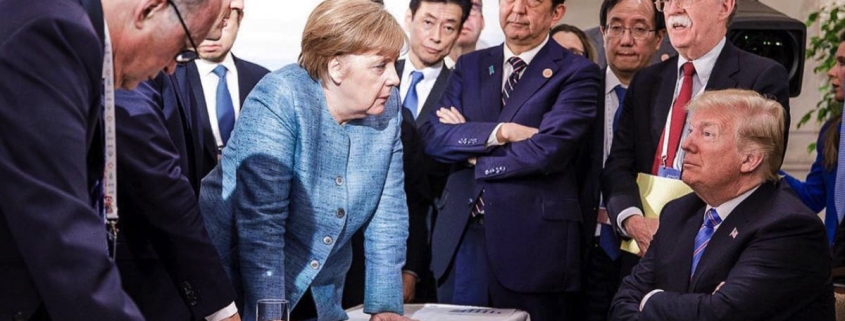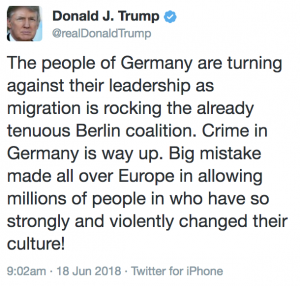Who Taught Trump about Weaponized Migration?
Amid the ongoing family separation crisis, I want to look back at something that raised a few eyebrows among the more generalized nausea at Trump’s behavior at the G-7. The WSJ reported this comment Trump made to Shinzo Abe in the context of the horror it elicited from European leaders and along with a related comment he made to Emmanuel Macron.
At one point, Mr. Trump brought up migration as a big problem for Europe and then told Mr. Abe, “Shinzo, you don’t have this problem, but I can send you 25 million Mexicans and you’ll be out of office very soon,” according to the senior EU official who was in the room. A sense of irritation with Mr. Trump could be felt, “but everyone tried to be rational and calm,” the person said.
The EU official said at another point, in a discussion over Iran and terrorism, Mr. Trump verbally jabbed at Mr. Macron, “You must know about this, Emmanuel, because all the terrorists are in Paris,’” the senior official said.
What Trump is talking about when he suggests he could send 25 million Mexicans to Japan is weaponized migration, as envisioned here, the deliberate creation of migration influxes to take out a political leader. In spite of the salience of racism in our politics, it’s not a common concept here. But in Europe, where migration from a destabilized Northern Africa and Middle East poses (as I heard a few MEPs say just before the election in 2016) the single biggest threat to the EU project, it’s a very real concern. For some time, the political cost of her human rights approach to migration has been the key weakness Angela Merkel’s opponents exploit. And in the days since the G-7, the topic of migration has threatened, for the second time this year, to collapse Merkel’s governing coalition.
For some time, there have been signs that the migration from (especially) Syria had been weaponized in two ways: first, by the seeming release of waves of migration that in their intensity would overwhelm Europe’s ability to respond. And more importantly, by the inclusion of terrorists, including returning European Arabs, among the waves of migrations. Most notably, four of the men who attacked the Stade de France on November 13, 2015 came in with a wave of other migrants. While Europeans respond more rationally to terrorist attacks than Americans do, by tying this one to migration, it made the waves of migrants in Europe far more politically toxic than they would otherwise be.
And while it was clear that the migration from Libya and Syria was being orchestrated for maximum damage, at the time (and still) it wasn’t clear who was behind it. Turkey (as the host of many of the Syrian refugees), Saudi Arabia (which maximized the instability of Syria to support ousting Assad), and Syria itself were all possibilities. On February 25, 2016 testimony viewed as particularly inflammatory, then NATO Commander Phillip Breedlove placed the blame squarely on Russia and Syria.
To the South from the Levant through North Africa, Europe faces a complicated mix of mass migration spurred by state instability and state collapse.
And masking the movement of criminals, terrorists and foreign fighters. Within this mix, Daesh — ISIL or Daesh, as I called them, is spreading like a cancer, taking advantage of paths of least resistance, threatening European nations and our own with terrorist attacks. Its brutality is driving millions to flee from Syria and Iraq, creating an almost unprecedented humanitarian challenge.
Russia’s enter into the fight in Syria has wildly exacerbated the problem, changing the dynamic in the air and on the ground. Despite public pronounces (sic) to the contrary, Russia (inaudible) has done little to counter Daesh but a great deal to bolster the Assad regime and its allies. Together, Russia and the Assad regime are deliberately weaponizing migration from Syria. In an attempt to overwhelm European structures and break European resolve.
Around the time Breedlove gave this testimony, GRU hackers would hack Breedlove as a key focus of the DC Leaks campaign that paralleled — but should in my opinion be considered a separate campaign from — the hack and leak of the DNC.
So Trump’s comment, while addressed to Abe, was instead intended for the benefit of Macron and, even more specifically, Merkel, and subsequent events have only borne out the salience of the comment.
I want to know who prepped the fantastically unprepared Trump to deliver this line. Trump knows virtually no policy well enough to deliver a zinger like this, and yet he knew how best to deliver a line to exploit the real vulnerabilities of all the European members of the G-7. And while, from the comments kicking off his campaign by inventing rapist immigrations from Mexico, Trump is perhaps at his best when he’s mobilizing racism, this comment had a more sophisticated vector than his usual bombast. Further, Trump public comments are, so often, just a regurgitation of the last person he engaged closely with. Which makes me acutely interested in who has both the access and the ability to direct his interests such that he managed this line.
There are certainly candidates in his orbit. Obviously, Stephen Miller is all too happy to politicize immigration. But in truth, it’s not clear (though the jury may still be out) that he’s any good at it. The Muslim ban has serially backfired (though we’ll see what SCOTUS says in a few hours), and unified centrists and even conservative supporters of America’s wonderful diversity against Trump in early days of his regime. The family separation policy, thus far, has provided Democrats an effective way to humanize Trump’s vicious policies, and the White House’s failure to manage the messaging of Miller’s hostage-taking has only made things worse. The other key policy effort to politicize immigration, Jeff Sessions’ focus on MS-13, has largely been a laughable dud, both because those who actually comment on the policy recognize that MS-13 is an American phenomenon, and because MS-13 has never done anything as spectacular as ISIS and Al Qaeda with which to generate visceral fear or even much press attention on the policy.
Steve Bannon, who has hob-nobbed with the European far right and is far more sophisticated than Miller, is another likely source for Trump’s remarkably sophisticated understanding of weaponized migration.
I think neither John Bolton nor John Kelly would be the culprit, the former because he’s a different kind of asshole than the racists Miller and Bannon, the latter because his racism has always lagged Trump’s and he seems to have lost much of the control he has over Trump in recent days. Mike Pompeo is also a racist, and a savvy one at that, but I’m not sure even he is cynical enough to prep this line from Trump.
Whoever it was, that line is not just horrifying on its face, but horrifying because whoever explained how weaponized migration works when wielded by competent actors seems to have privileged access to Trump right now.
Update: I first posted this at 8:27. At , Trump tweeted this:



